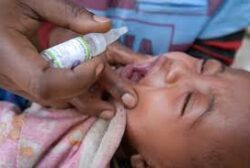Over 1.3 million future deaths were averted in 2023 thanks to vaccination programs supported by Gavi, the Vaccine Alliance.
This achievement, which translates to over 2 lives saved every minute of the day, is highlighted alongside historic progress in the battle to prevent cervical cancer through HPV vaccinations and a record level of co-financing from the countries Gavi supports in Gavi’s 2023 Annual Progress Report which is published today.
With 69 million children immunized in 2023, the second highest number of children immunized in one year ever, the report details that the number of children that have now been protected with routine childhood vaccines since Gavi was founded in 2000 has now exceeded 1.1 billion. The economic benefits of these vaccinations to Gavi-supported countries since 2021 stands at US$ 52 billion, the report says.
Other highlights of 2023 for the Alliance include major progress against cervical cancer, with 14 million girls vaccinated against HPV with Gavi support. This number is greater than the previous ten years combined. Gavi has now helped prevent over 600,000 future deaths from cervical cancer alone and is on track to reach 86 million girls by the end of 2025.
In a sign that Gavi-supported countries increasingly recognize the importance of immunization programs, the amount of domestic resources mobilized in 2023, US$ 215 million, was the largest ever. This level of financial ownership – a key component of Gavi’s approach to sustainability and country ownership – was reaffirmed as 55 vaccination programs that were initially launched with Gavi funding are now fully financed by national governments as of 2023.
“By vaccinating children and the vulnerable, we not only enable millions of people to lead healthier, more fulfilled lives, we contribute to families’ prosperity, to strong and more stable communities and to economic development that is already translating into countries’ paying more towards their immunization programs than ever before,” said José Manuel Barroso, Chair of the Gavi Board.
“Gavi countries are on the front line of climate change, with many vulnerable to economic instability and geopolitical tension: for them to be able to immunize more children, not to mention expand important programs such as HPV, deserves recognition,” said Dr Sania Nishtar, CEO of Gavi, the Vaccine Alliance. “Fully funding Gavi for its next five-year period will be crucial in expanding these hard-won gains and helping countries further along the pathway to fully sustaining their own immunization programs.”
Summary of Gavi’s progress against its six mission indicators for 2021–2025:
More than halfway through its current strategic period, Gavi is on track to meet the majority of its mission indicators. This includes reaching 300 million children between 2021 and 2025; reducing under-five mortality by 10%; helping to prevent 7–8 million future deaths; reducing the overall health burden on countries that vaccine-preventable diseases impose; and delivering economic benefits of US$ 80–US$ 100 billion.
However, the Vaccine Alliance remains behind its 2025 target of reducing the number of ‘zero-dose’ children – those who have never received a single vaccine – by 25%. While many countries are reaching more children than ever, the COVID-19 pandemic, an increasing birth cohort combined with the challenges of climate and fragility are making it harder to reach the most vulnerable, and in 2023 the number of zero-dose children rose to 11 million.
Achieving the Alliance’s ambitious goal will require global health partners, working with governments and communities, to collaborate and innovate.
“No child should die from vaccine-preventable diseases. Through Gavi, the Vaccine Alliance we continue to bridge the gap between life-saving vaccines and the children who need them,” said Catherine Russell, UNICEF Executive Director.
As Gavi looks towards its next strategic period from 2026–2030, meeting its funding target of US$ 9 billion will be essential to expand protection against more diseases, ensure the most vulnerable populations are not left behind and protect the world against future disease outbreaks and pandemics.
“Vaccines are among the most powerful inventions in history,” said Dr Tedros Adhanom Ghebreyesus, WHO Director-General. “With continued and increased in investment in Gavi, we can harness their power, saving millions of lives in the coming decades.”
Gavi, the Vaccine Alliance is a public-private partnership that helps vaccinate more than half the world’s children against some of the world’s deadliest diseases. The Vaccine Alliance brings together developing country and donor governments, the World Health Organization, UNICEF, the World Bank, the vaccine industry, technical agencies, civil society, the Bill & Melinda Gates Foundation and other private sector partners.
Since its inception in 2000, Gavi has helped to immunize a whole generation – over 1.1 billion children – and prevented more than 18.8 million future deaths, helping to halve child mortality in 78 lower‑income countries. Gavi also plays a key role in improving global health security by supporting health systems as well as funding global stockpiles for Ebola, cholera, meningococcal and yellow fever vaccines. After two decades of progress, Gavi is now focused on protecting the next generation, above all the zero-dose children who have not received even a single vaccine shot.

